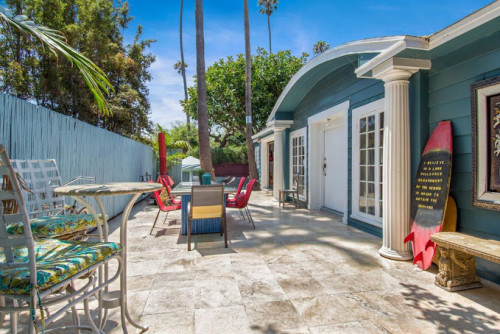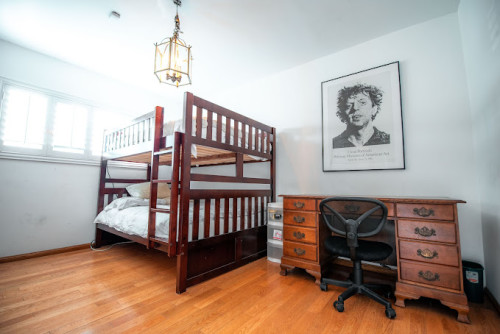






Living Now Sober Living
Treatment Focus
This center primarily treats substance use disorders, helping you stabilize, create relapse-prevention plans, and connect to compassionate support.
Primary Level of Care
Transitional housing designed to support individuals recovering from substance use disorders offering a safe, supportive and structured environment for practicing long-term sobriety, while reintegrating back into daily living.
This provider hasn't verified their profile's information. Are you the owner of this center? Claim your listing to better manage your presence on Recovery.com.
Treatment Focus
This center primarily treats substance use disorders, helping you stabilize, create relapse-prevention plans, and connect to compassionate support.
Primary Level of Care
Transitional housing designed to support individuals recovering from substance use disorders offering a safe, supportive and structured environment for practicing long-term sobriety, while reintegrating back into daily living.
Private Pay
You pay directly for treatment out of pocket. This approach can offer enhanced privacy and flexibility, without involving insurance. Exact costs vary based on program and length of stay. Contact the center for specific details.
Living Now Sober Living
Living Now Sober Living
About Living Now Sober Living
Sober Living Program
Living Now Sober Living focuses on wellness and recovery using creative tools and activities in a community setting. Residents are given a sense of accountability and healthy coping mechanisms, focusing on holistic healing, daily meditation, goal setting, participation in the 12-Step program, and weekly drug testing. Minutes from the Venice Beach Boardwalk, residents have access to several opportunities for employment, fitness establishments, skateparks, and Muscle Beach. Their community-focused program provides daily check-ins, weekly outings, and peer support groups along with family-integrated case management services. Living Now strives to provide the highest quality transitional living services at the most affordable cost in a desirable and healing setting.
Outpatient Support
Living Now works hand-in-hand with Thrive Treatment, an outpatient and aftercare addiction treatment center available to their residents. The clinical staff at Thrive has over 30 years of expertise, offering a well-rounded healing experience and a solid foundation on which recovery can continue to be built and supported. The outpatient program uses evidence-based treatment methods such as cognitive behavioral therapy (CBT) and dialectical behavioral therapy (DBT), which helps patients process and discard self-defeating behaviors. Their holistic and trauma-focused approach also incorporates practicing mindfulness and meditation techniques. Their outpatient support along with their safe and sober living environment helps residents gain the accountability, life skills, and coping mechanisms needed to achieve success in long-term recovery.
Mentoring Program
Living Now offers transitional support for residents in the process of moving from sober living and into their independent lives with their mentoring program. Their mentoring program keeps alumni in contact with each other offering continued recovery support and accountability. Participants can set both weekly and long-term goals, have continued access to drug testing and medication monitoring, and receive financial and career guidance to continue growth and success in recovery.
Center Overview
Treatment Focus
This center primarily treats substance use disorders, helping you stabilize, create relapse-prevention plans, and connect to compassionate support.
Pricing and Program Length
Estimated Center Costs
Center pricing can vary based on program and length of stay. Contact the center for more information. Recovery.com strives for price transparency so you can make an informed decision.
Levels of Care





Your Care Options
Specializations
Sober Living
These structured living environments help people transition out of rehab. Residents have more freedom than they do during rehab, but still follow certain rules.
Who We Treat
Approaches
Twelve Step
Incorporating spirituality, community, and responsibility, 12-Step philosophies prioritize the guidance of a Higher Power and a continuation of 12-Step practices.
Therapeutic Community
Therapeutic communities allow patients to contribute to the success and progress of their community, through healthy behaviors or even basic chores.
Gender-Specific
Separate treatment for men or women can create strong peer connections and remove barriers related to trauma, shame, and gender-specific nuances.
Spiritual Emphasis
Spirituality connects patients to a higher power and helps strengthen their recovery, hope, and compliance with other treatment modalities.
Evidence-Based
A combination of scientifically rooted therapies and treatments make up evidence-based care, defined by their measured and proven results.
Family Involvement
Providers involve family in the treatment of their loved one through family therapy, visits, or both–because addiction is a family disease.
Therapies
Twelve Step Facilitation
12-Step groups offer a framework for addiction recovery. Members commit to a higher power, recognize their issues, and support each other in the healing process.
Meditation & Mindfulness
A practiced state of mind that brings patients to the present. It allows them to become fully aware of themselves, their feelings, and the present moment.
Life Skills
Teaching life skills like cooking, cleaning, clear communication, and even basic math provides a strong foundation for continued recovery.
Substances We Treat
Prescription Drugs
It's possible to abuse any drug, even prescribed ones. If you crave a medication, or regularly take it more than directed, you may have an addiction.
Benzodiazepines
Benzodiazepines are prescribed to treat anxiety and sleep issues. They are highly habit forming, and their abuse can cause mood changes and poor judgement.
Drug Addiction
Drug addiction is the excessive and repetitive use of substances, despite harmful consequences to a person's life, health, and relationships.
Heroin
Heroin is a highly addictive and illegal opioid. It can cause insomnia, collapsed veins, heart issues, and additional mental health issues.
Methamphetamine
Methamphetamine, or meth, increases energy, agitation, and paranoia. Long-term use can result in severe physical and mental health issues.
Opioids
Opioids produce pain-relief and euphoria, which can lead to addiction. This class of drugs includes prescribed medication and the illegal drug heroin.
Alcohol
Using alcohol as a coping mechanism, or drinking excessively throughout the week, signals an alcohol use disorder.
Languages
Aftercare
Care Designed for Your Needs
Personal Amenities
Amenities
Special Considerations
Gender-specific groups
Patients in gender-specific groups gain the opportunity to discuss challenges unique to their gender in a comfortable, safe setting conducive to healing.





